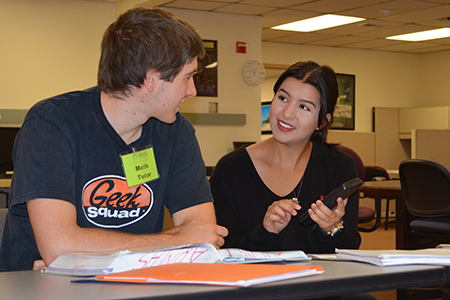
Photo: Margaret McKinney/Highlands University
Biochemistry sophomore Karly Ortiz, right, works with ARMAS math tutor and senior math major Jacob Kelly to calculate a logarithm in the ARMAS Center. Ortiz is from Las Vegas, New Mexico and Kelly is from Ojo Feliz, New Mexico.
Las Vegas, NM — Excelenica in Education named the Highlands University Achieving in Research, Math and Science Center as one of the top college programs in the nation for increasing graduation rates among Hispanic students.
Students who accessed ARMAS services were 3.8 times more likely to earn degrees or remain enrolled in science, technology, engineering or math, or STEM, when compared to their Highlands counterparts who didn’t use ARMAS, according to a 2012 Highlands Office of Institutional Effectiveness and Research study.
“ARMAS at Highlands University is at the forefront of meeting the challenge of improving higher education achievement for Latino students,” said Sarita Brown, president of Excelincia in Education, a Washington, D.C. nonprofit that works to accelerate Latino success in higher education.
ARMAS was nominated from among 217 programs from 26 states and was one of only four finalists in the four-year college category.
Now in its fifth year, the Highlands ARMAS Center provides comprehensive support services to STEM students and faculty at Highlands. Science majors at the university have increased 29 percent since the program began.
Use of ARMAS services have increased sharply over the years. In the 2009-2010 academic year, 116 students registered and accessed services 2,300 times. In the 2013-2014 academic year, 409 students registered and used the center approximately 11,000 times.
“The key to ARMAS’ success is the staff and student workers who make the center a friendly, supportive place to focus on doing well in school,” said Edward Martínez, ARMAS director and natural resources management professor. “Some of the best practices that we’re implementing include peer-facilitated studying, professional development for STEM faculty, and paid internships for students in their field of study — 120 to date.”
ARMAS also provides math tutoring, computers, a place to study, and other resources.
Elizabeth Ratzlaff is the ARMAS Center coordinator and data manager, Monique Esquibel is the internship coordinator, and Russell Baker is the academic coach.
“We recognize that choosing to be a STEM major involves a lot of challenging classes that require hard work and extra time to be successful,” Ratzlaff said. “At ARMAS, we have a strong community of students who support and encourage each other to persevere and succeed. It’s a powerful dynamic.
“We have also emphasized using funds to hire students as math tutors, front desk receptionists, and supplemental instruction leaders,” Ratzlaff said.
Melecio Perea is an ARMAS student. The 20-year-old Las Vegas, New Mexico native and chemistry junior has earned a 4.0 GPA.
“From the first time I walked into the ARMAS Center as a freshman, I felt that the staff really wants students to succeed in academic endeavors,” Perea said. “They have created a very welcoming environment, which I think helps students have a positive and productive learning experience.”
Perea went on to become a supplemental instructional leader for the courses Calculus 1, General Chemistry 2, and Organic Chemistry 2.
“As a supplemental instruction leader, the goal is to facilitate group study sessions where students don’t just learn the course content but also study strategies and techniques that help them succeed in future courses. Collaboration is important because it allows students to explore paths to problem solving they might not have thought of individually,” Perea said.
Scholarships are another component of ARMAS. Perea was named an ARMAS Scholar in 2014 and was awarded a renewable $10,000 annual scholarship.
“ARMAS scholarships help students financially so they can focus 100 percent on their education,” Perea said.
The Achieving in Research Math and Science Center at Highlands was established in 2009 with a $2.2 million grant from the U.S. Department of Education. Grants followed from the Kellogg Foundation, National Science Foundation, and more.
“ARMAS has been highly successful in obtaining grant funding,” Martínez said. “Highlands has also begun the process of supporting the program financially.”
